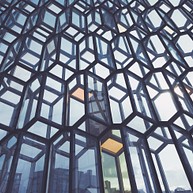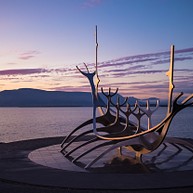
-
![Harpa concert hall and conference centre - Reykjavik, Iceland]() Provided by: Lance Anderson/Unsplash
Provided by: Lance Anderson/Unsplash

Our travel guides are free to read and explore online. If you want to get your own copy, the full travel guide for this destination is available to you offline* to bring along anywhere or print for your trip.
*this will be downloaded as a PDF.Price
€4,95
Harpa
The guide was updated:One of Reykjavík's most iconic landmarks and a must-visit while in Iceland is Harpa, the city's concert hall and conference centre, as well as home to the Icelandic Opera and the Icelandic Symphony Orchestra.
Located by the old harbour, near the centre of Reykjavík, this striking bit of contemporary architecture boasts a glass facade, which covers the entire building featuring honeycomb panels, which change colours during the day as they reflect the sky and the ocean. At night, a light show makes the building look even more magical.
Useful Information
- Address: Austurbakki 2, Reykjavík
- Opening hours: Daily noon–4pm
- Website: www.harpa.is/en
- Phone: +354 528 5050
- Email: harpa@harpa.is
Digital Travel Guide Download
Our travel guides are free to read and explore online. If you want to get your own copy, the full travel guide for this destination is available to you offline* to bring along anywhere or print for your trip.
*this will be downloaded as a PDF.Price
€4,95

Hallgrímskirkja is an iconic part of Reykjavík's skyline and at 74.5 metres tall, it is one of the tallest structures in the country.
The gigantic church on the hill was a controversial project, but Icelanders have come to embrace their monumental tower in all its brutalist glory. The concrete mountain which took over 40 years to construct was inspired by the unusual columnar basalt formations along Iceland’s coast.
You can admire the building inside and outside, go to the top of the tower to catch the view or attend an organ concert.
The church is named after Hallgrímur Pétursson — a 17th-century minister and poet who wrote the 'The Passion Hymns'. The book remains popular to this day.
Read more

Iceland Airwaves
The festival is regarded as the biggest celebration of music in Iceland and boasts an unrivalled line-up of established and up-and-coming artists.
Read more

Harpa
One of Reykjavík's most iconic landmarks and a must-visit while in Iceland is Harpa, the city's concert hall and conference centre, as well as home to the Icelandic Opera and the Icelandic Symphony Orchestra.
Located by the old harbour, near the centre of Reykjavík, this striking bit of contemporary architecture boasts a glass facade, which covers the entire building featuring honeycomb panels, which change colours during the day as they reflect the sky and the ocean. At night, a light show makes the building look even more magical.
Read more

Sun Voyager
On the waterfront, only a few minutes from Harpa sits the most famous sculpture in Iceland, the Sólfarið or the Sun Voyager.
Made of steel and resembling a Viking ship — although this was not the artist's intention — the Sun Voyager is, according to its creator Jón Gunnar Árnason, an ode to the sun, a dreamboat symbolising the promise of undiscovered territory, the dream of hope, progress, and freedom.
This is also one of the best spots for a picture in Reykjavík, with Mount Esja providing the perfect backdrop.
Read more

The Blue Lagoon
The Blue Lagoon is without a doubt the most well-known geothermal spa in Iceland. The signature milky-blue water makes a stark contrast to the surrounding black lava fields and creeping grey moss. The spa is located in a lava field near Grindavík and is supplied by water used in the nearby Svartsengi geothermal power plant. The water temperature stays at 39°C year-round, snowfall or sunshine.
Most visitors make the spa their first or last stop, since it's conveniently located only 15 minutes from the Keflavík International Airport (and around 30 minutes from the capital city). If you are buying a tour, it makes most sense to combine the spa visit with the Golden Circle day trip.
Bookable
Read more

See Iceland's Northern Lights
Watching the northern lights or aurora borealis dance across the sky is, without a doubt, on the bucket list of most travellers visiting Iceland. Although there are no guarantees that you will see them on your visit, with luck and some planning, there is a high chance of catching this spectacular display.
You can spot the northern lights in the Icelandic skies from late August through May, but the peak season to witness this stunning natural phenomenon is between October and April.
Bookable
Read more

Take a Walk with a Viking
Walking tours are great options if you want to quickly orient yourself in a new city within 2–3 hours and meet a couple of fellow travellers. Your Viking guide will make sure you don't walk past any hidden gems and tell you stories of the Vikings, elves and modern-day Icelanders.
Some tours might include lunch, others — booze. It's up to you how to stay warm.
Bookable
Read more

The Golden Circle Route
Simply put, Iceland’s famous Golden Circle is a popular route between three of the island's most visited attractions. Usually done as a day trip, the route starts in Reykjavik and takes you south and inland, to the Þingvellir National Park. There you enter the Geyser geothermal area with the Strokkur Geyser being most eager of the bunch. Finally, you arrive at to the 32-metre tall Gullfoss waterfall in the canyon of the roaring Hvítá river.
Many tour agents and travellers themselves like to make extra stops along the way to see a geothermal power plant or spend a few hours at one of the spas.
You could rent a car and drive between the landmarks at your own speed. In summer, you could even use the long daylight hours to avoid the crowds that tend to come earlier in the day. If you can pick your own route, don't miss the Kerid Crater Lake — a scenic lake that occupies a 3,000 years old volcanic crater that you can easily reach on foot.
Bookable
Read more

Perlan — The Pearl
Perlan is an otherworldly creation with a viewing platform and a revolving restaurant on top of water storage tanks. Apart from the glass domed restaurant, the complex hosts an exhibition space, a planetarium and an observation deck.
Read more

Reynisfjara Black Beach
The onyx black sand of Reynisfjara is formed from volcanic activity in Iceland: when lava collides with the ocean, it rapidly cools and shatters into small fragments of basalt. With its enormous basalt stacks (features in Game of Thrones and once believed to be petrified trolls), roaring Atlantic waves and stunning vistas, Reynisfjara is widely considered to be the most beautiful example of Iceland’s black sand beaches.
The sea stacks along the shore are home to thousands of nesting seabirds like puffins, fulmars and guillemots — a must-see for birdwatchers.
A visit to Reynisfjara is included in most tours of southern Iceland. Driving here is a good option, too, since it's only about 180 km from Reykjavík.
Read more

DC3 Plane Wreck
The Super DC-3 aircraft crashed into Sólheimasandur back in 1973, thankfully leaving its seven crew members unharmed. Since then the empty husk of a plane has been left exposed to the elements, rusting away in constant humidity and cracking from constant freezes and thaws. The wreckage is a particularly beloved spot by local and visiting photographers thanks to its sparse and wild surrounding black sand landscape and its incredible visual contrast to the aircraft’s gnarled metal carcass.
To visit the plane wreck, you can join organised hiking, horse riding or ATV riding tours, take a bus or get there by yourself. Remember, that driving over the sands is considered to be driving off-road and carries heavy fines.
Lastly, the wreck is located pretty close to the village of Vik made famous after a popular Netflix series Katla.
Bookable
Read more


